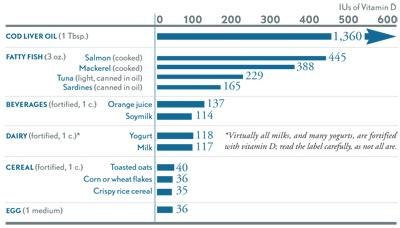
By Brierley Wright, M.S., R.D., EatingWell Nutrition Editor
I know I’m not getting enough vitamin D, which—as a dietitian and nutrition editor of EatingWell Magazine—I hate to admit.
Except for in my coffee, I don’t care much for milk (a food that’s fortified with D). I also spend most of my weekday hours indoors behind a computer, I slather any sun-exposed skin with sunscreen when I go outdoors and I live north of the midsection of the country—all of which means I’m not getting enough sunlight for my body to produce the quantity of D I need. (Ultraviolet, or UV, rays penetrate the skin’s uppermost layer, causing skin cells to produce a form of vitamin D, which is then processed—along with vitamin D from food—by the liver and kidneys and converted to the active form of the vitamin.)
I’m not alone: some studies suggest that as many as 7 out of 10 Americans don’t get enough of the “sunshine vitamin.” Interesting, considering the Institute of Medicine recently upped the daily recommended amount (for ages 1 to 70) to 600 International Units (IUs).
Having sufficient levels of D is important for everyone, me included. The vitamin practically deserves super-nutrient status:
- Vitamin D helps bones absorb calcium, keeping them strong and preventing osteoporosis.
- It may offer protection against cancer—lowering the risk of some types like breast, prostate and colorectal.
- Studies suggest it can help with depression and in preventing seasonal mood swings.
- Adequate D may help lower heart disease risk. Research has linked low levels of vitamin D with both cardiovascular disease and conditions that increase risk of cardiovascular disease, such as high blood pressure and diabetes.
- Vitamin D could help with weight control. In some studies, people with higher body mass indexes (BMIs) tend to have lower D levels. Also, upping vitamin D (and calcium) intake may have helped boost weight loss in one recent study of dieters.
Although I really should be more diligent about taking a vitamin D supplement, the nutritionist in me would rather try to eat more D-rich foods instead. But because you don’t have many options with vitamin D, check out this chart to know how they stack up.

Must-Try Meals: Recipes to Get More Vitamin D
How do you get enough vitamin D?
Brierley's interest in nutrition and food come together in her position as an associate editor at EatingWell. Brierley holds a master's degree in Nutrition Communication from the Friedman School of Nutrition Science and Policy at Tufts University. A Registered Dietitian, she completed her undergraduate degree at the University of Vermont.
Related Links from EatingWell: